

Instagrok. - Twelve Reasons To Teach Searching Techniques With Google Advanced Search? Even Before Using The Basic Search by Michael Gorman. 0 Comments March 29, 2011 By: Guest Blogger Mar 29 Written by: 3/29/2011 1:36 AM ShareThis Did you know that the Google Basic Search Engine actually calls for some very advanced skills.
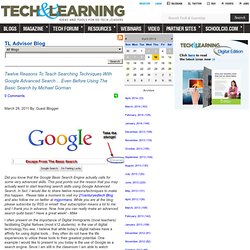
I often present on the importance of Digital Immigrants (most teachers) facilitating Digital Natives (most k12 students) in the use of digital technology.You see, I believe that while today’s digital natives have a affinity for using digital tools… they often do not have the life experiences to utilize these tools to their greatest potential. I would suggest that educators direct students towards the Google Advanced Search Engine even before using the Google Basic Search. Twelve Reasons To Teach Searching With Google Advanced Search 1. All these words (above picture) allows the AND statement (AND is actually not needed in Google since it is inferred when multiple words are put in. This exact wording or phrase (above picture) allows words to be put together in a STRING. A Brief History of Technology in Education.
Digital Bloom's. Why Integrate Technology into the Curriculum?: The Reasons Are Many. VIDEO: An Introduction to Technology Integration Running Time: 5 min.

Technology is ubiquitous, touching almost every part of our lives, our communities, our homes. Yet most schools lag far behind when it comes to integrating technology into classroom learning. Many are just beginning to explore the true potential tech offers for teaching and learning. IMPLEMENTING THE SEVEN PRINCIPLES - Chickering and Ehrmann. For more teaching ideas, workshop materials and evaluation ideas, go to IMPLEMENTING THE SEVEN PRINCIPLES: Technology as Lever by Arthur W.
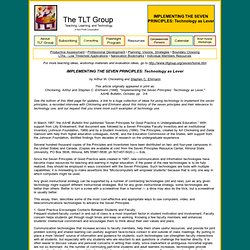
Chickering and Stephen C. Ehrmann This article originally appeared in print as: Chickering, Arthur and Stephen C. See the bottom of this Web page for updates, a link to a huge collection of ideas for using technology to implement the seven principles, a recorded interview with Chickering and Ehrmann about this history of the seven principles and their relevance to technology use, and our request that you share more such examples of technology use.
In March 1987, the AAHE Bulletin first published “Seven Principles for Good Practice in Undergraduate Education.” Several hundred thousand copies of the Principles and Inventories have been distributed on two- and four-year campuses in the United States and Canada. 1. The biggest success story in this realm has been that of time-delayed (asynchronous) communication. 2. 3. 4. 5. 6. Taking Technology to the Classroom: Pedagogy-Based Training for Educators. Note: This article was originally published in The Technology Source ( as: David P.
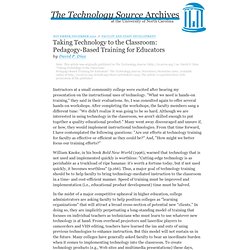
Diaz "Taking Technology to the Classroom: Pedagogy-Based Training for Educators" The Technology Source, November/December 2001. Available online at The article is reprinted here with permission of the publisher. Instructors at a small community college were excited after hearing my presentation on the instructional uses of technology.
"What we need is hands-on training," they said in their evaluations. Search Engines. Tips for Using Search Engines When you are unable to find the information you need on any of the recommended web sites, it is always possible to do your own search using one of the popular search engines.
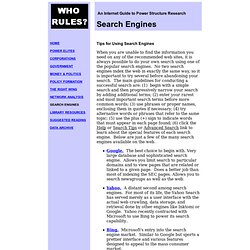
No two search engines index the web in exactly the same way, so it is important to try several before abandoning your search. The main guidelines for conducting a successful search are: (1) begin with a simple search and then progressively narrow your search by adding additional terms; (2) enter your rarest and most important search terms before more common words; (3) use phrases or proper names, enclosing them in quotes if necessary; (4) try alternative words or phrases that refer to the same topic; (5) use the plus (+) sign to indicate words that must appear in each page found; (6) click the Help or Search Tips or Advanced Search link to learn about the special features of each search engine.
Below are just a few of the many search engines available on the web. History of Search Engines - Chronological List of Internet Search Engines (INFOGRAPHIC) Below is a visual history of "search" and search engines; hopefully it's both a trip down memory lane and a useful resource for anyone looking to learn a bit more about the history of Internet search engines.

If you like the graphic or find it useful you're welcome to embed the image on your own site, link to it, or give it a Digg/Stumble/Etc. Without further fanfare, we present to you WordStream's search engine history timeline. The History of Search Engines Modern search engines are pretty incredible – complex algorithms enable search engines to take your search query and return results that are usually quite accurate, presenting you with valuable information nuggets amidst a vast information data mine. The Role of the Online Instructor/Facilitator.
EdTechLeaders: Online Workshop Facilitation Guide. Online Workshop Facilitation GuideDeveloped by EDC's Center for Online Professional Education Facilitator Roles and Strategies | Expectations for Participants Facilitator Roles and Strategies Online course facilitators, like classroom teachers, play a variety of roles.
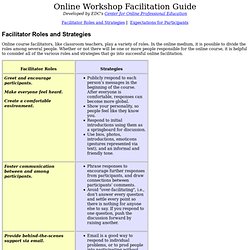
In the online medium, it is possible to divide the roles among several people. Whether or not there will be one or more people responsible for the online course, it is helpful to consider all of the various roles and strategies that go into successful online facilitation. Expectations for Participants Depending on the course content and goals, participants may be expected to play a variety of roles. Basic Requirements Online courses require access to a computer that can log onto the Internet, and a base level of technical knowledge and comfort. Most computer experiences include elements of both excitement and frustration. Time Commitment Individuals or Teams © Copyright 2000 Education Development Center, Inc. Ten Best Practices for Teaching Online. J.
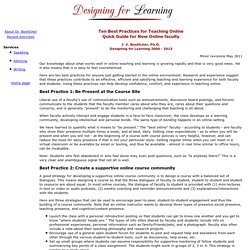
V. Boettcher, Ph.D. Facilitator Tool Kit.pdf. Best-Practices-in-Online-Teaching-Strategies-Membership. Onlinelearning-mastering-online-discussion-board-facilitation.pdf.